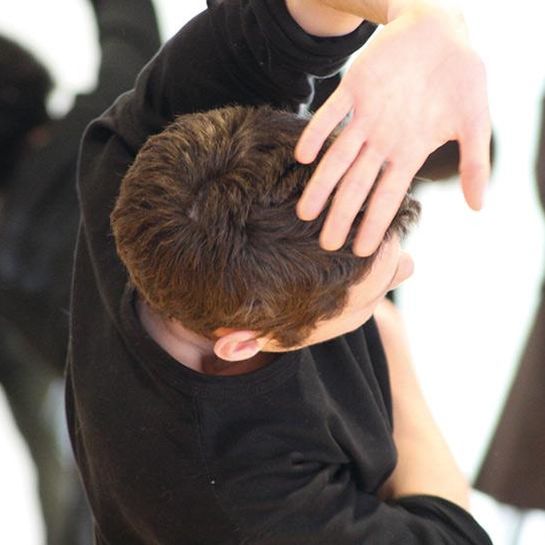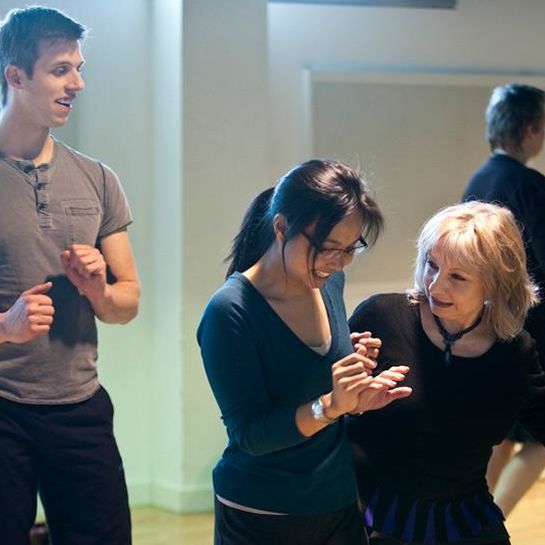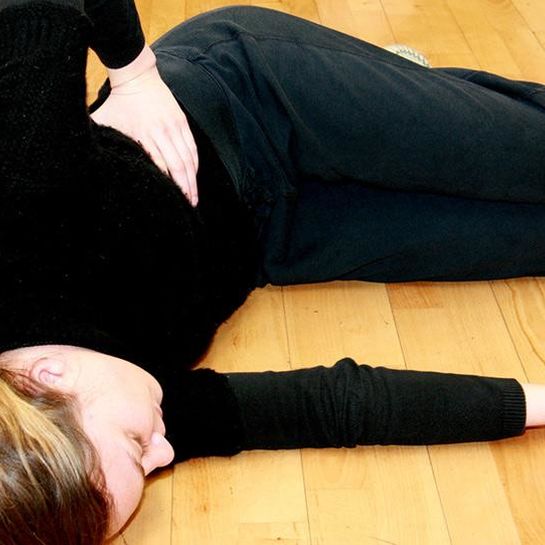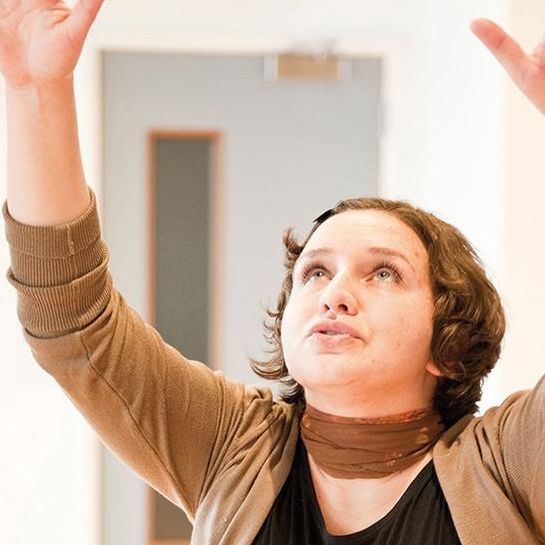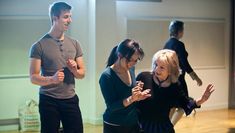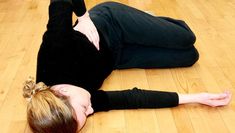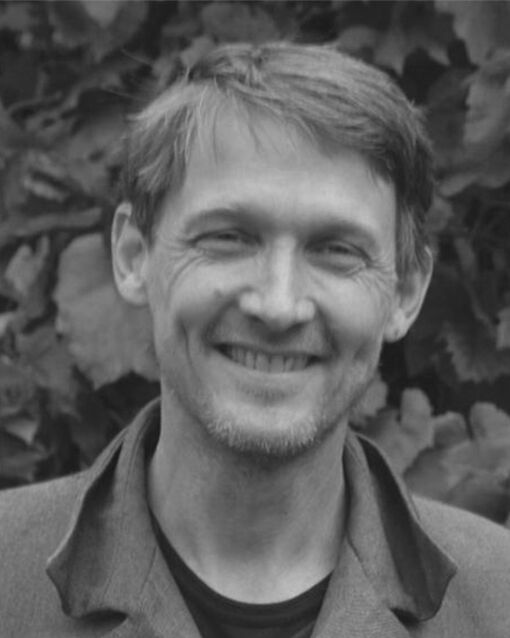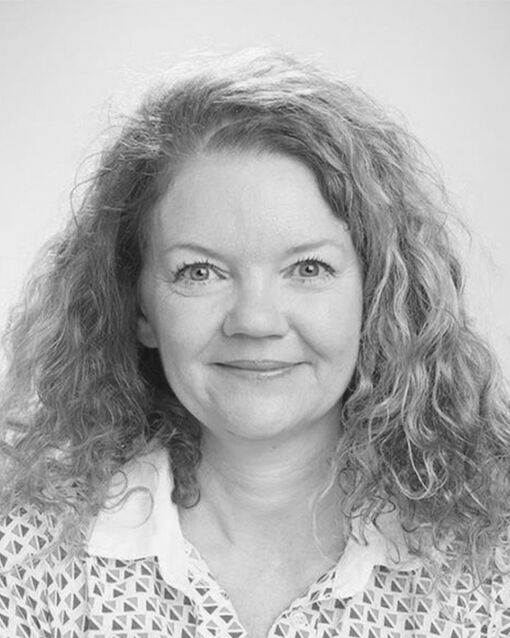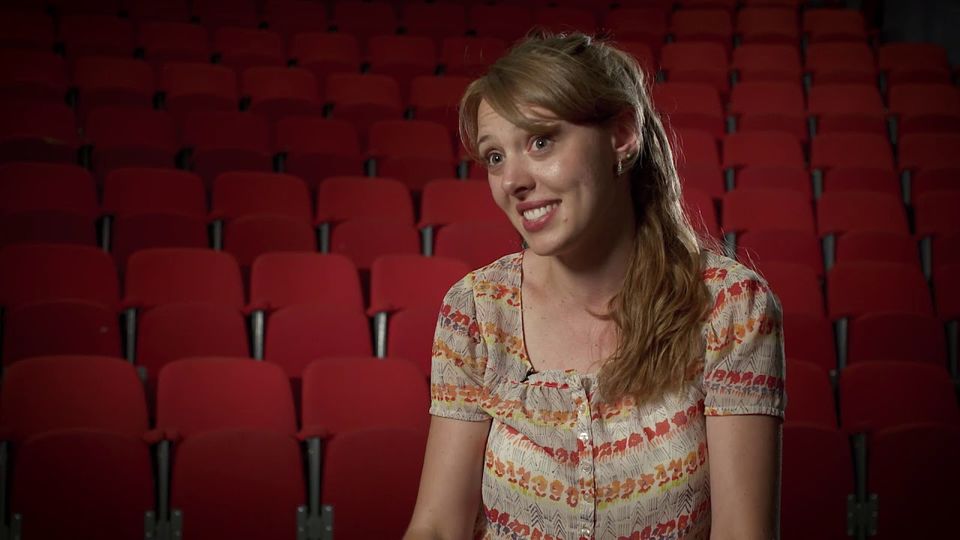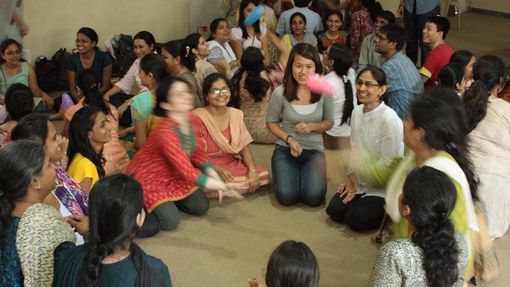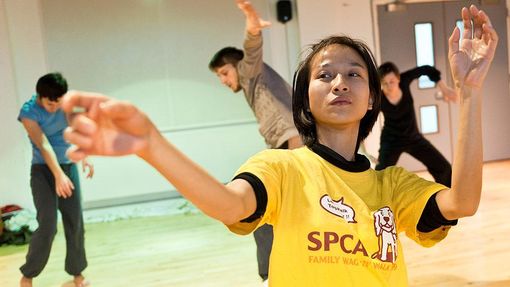Course information
Apply now buttons
Apply here:
Buttons
About this course
The MA Drama and Movement Therapy course at Central offers a particular pedagogic approach to learning the craft of dramatherapy and is a unique combination of drama and movement within an intensive experiential training.
Studying on the course, you will:
- Receive HCPC approved vocational training in the Sesame Approach to dramatherapy
- Use a critical framework of Jungian psychology combined with contemporary theories in intersubjectivity and developmental psychology
- Obtain apprenticeship model placements within NHS institutions, voluntary and education sectors with supervision
Our approach
The Sesame Approach is informed by Jungian psychology and draws together Laban movement, play theory and Billy Lindkvist’s work with movement with touch and sound. Storytelling and image-based practice reflect a mythopoetic approach to the psyche. The combination of movement-based studio practice, collaborative facilitations, seminars and a shared research unit with other MA students creates a learning environment that encourages personal exploration, collaboration and critical reflection.
Particularly in the first year, you will experience immersive practice in the subject areas of Laban movement, myth, movement with touch and sound, and drama. This is allied with studies in developmental and analytical psychology – specifically combining emergent knowledge of intersubjectivity and the work of Jung.
The group process is central to your learning experience and supported by a weekly session across the first year which explores interpersonal dynamics and draws from group analytic theory.
Placements
Placements are at the heart of the training and begin in the second term with the hallmark apprenticeship model. This offers well-supported early clinical practice with a specialist and qualified supervisor working alongside you as you begin to practise. All apprenticeship placements are arranged by Central and will normally include working with adults with mental health problems, elderly clients with dementia, people with learning disabilities, children with challenging behaviour and people on the autistic spectrum. The apprenticeship model is applied to placements in the spring and summer terms of the first year.
In the second year, the Sustained Independent Project unit combines further placement practice working with different client groups, alongside individual and group supervision. You will also cultivate your professional identity during the second year through preparation for professional practice sessions in advance of the final assessment of a viva and the submission of a 12,000-word portfolio. The performing research unit also takes place in the second year and is an opportunity to research a particular area of practice.
HCPC Membership
Upon receiving the master’s award, you are eligible to apply to the Health and Care Professions Council for membership as an arts therapist (drama).
Accordion
-
Course Detail
This course is taught across two years.
Year One
In year one, term one, you study two units. Unit One (Drama and Movement Therapy Practice) includes weekly sessions in the subjects of drama, myth, Laban, movement with touch and sound, and preparation for clinical practice. These strands combine to offer an experiential introduction to the discipline and a means for you to engage with your own process as a foundation for learning.
Unit Two (Therapy and Psychology) is seminar-based with two strands: Analytical Psychology introduces you to the core concepts of Jung’s psychology and Developmental Psychology looks at emerging developmental theory and refers to, amongst others, Winnicott and Stern. Both strands offer a theoretical framework within which to examine and critique the practice of dramatherapy and the Sesame Approach.
In terms two and three, the Facilitation Practice unit includes individual and pair work in the subject strands of Myth, Laban, Drama and Movement with Touch and Sound. You will research and lead sessions both individually and collaboratively. This unit offers a substantial opportunity to develop skills in planning, practice and peer feedback. The Performing Research unit is a shared postgraduate unit, which introduces fundamentals in research, including reference to methodologies that are performative and practice-based. The Practices One and Practices Two units frame two apprenticeship placements in the spring and summer term of the first year. These are supported by on-site specialist supervision as well as weekly sessions in preparation for clinical practice and group supervision at Central.
Year Two
Year two begins with the Sustained Independent Practice (SIP) unit, and you will undertake placement work to accumulate the required 100 sessions of client contact. Central supports you in finding placements during the second year and you are assigned an individual supervisor. You are at Central every Monday in term time in the second year for sessions in supervision, professional practice, and tutorials. In addition, Performing Research is a shared postgraduate unit, which introduces fundamentals in research, including reference to methodologies that are performative and practice-based. This begins in the spring term of the second year.
The final piece of written work is a portfolio, which includes a 7,000-word critical essay, a 4,000-word report on clinical practice and a plan for future professional development. The final assessment is a viva voce.
All clinical supervision costs are included in the course fees. You are required to be in individual therapy for the duration of the course, for which a Jungian analyst is strongly recommended. You are also required to join a dramatherapy group and complete at least 30 sessions. Please note that some of the dramatherapy groups may continue to run during the holiday periods.
The cost of therapy is NOT included in the course fees.
Assessments
This is by a range of methods which include written assignments, assessment of clinical practice and ongoing group work. There is ongoing tutor, peer and self-assessment. Assessment on placement is a key indicator of progress and standards of proficiency.
-
Entry Requirements and Interviews
Offers will be based on merit alone. Scholarships are available.
You should normally possess an arts education or psychology degree. If you do not have a first degree (or equivalent), but have relevant professional experience working with the arts in a community, educational or care setting, you will be considered for non-standard entry.
An offer will normally only be made after interview.
We particularly encourage applications from groups currently under-represented in higher education, such as students with disabilities and members of Black, Asian and Minority Ethnic groups. Find out more information on Central’s commitment to equality and diversity.
English Language Requirements
Applicants for whom English is not their first language are required to prove their English language proficiency by gaining an overall score of 7.0 in an IELTS test. We do accept equivalent English language qualifications.
While a test result is not required in order to submit an application, applicants are advised to gain this certification as early as possible and more information can be found through the English Language Requirements page.
Interviews
If you are selected for an interview for a place on the Drama and Movement Therapy, MA course, we will require you to create and submit a short film ahead of the interview that answers the following questions:
- What is your understanding/ experience of the Sesame approach to drama and movement therapy?
- What are your reasons for applying for this programme?
- What are your experiences of working with drama and/or movement?
- Any questions you may have concerning the programme in terms of content, assessment, approach, etc.
On the day of the interview at our London campus, the morning session will include group work, which introduces some practical exercises and an introduction to certain aspects of the Sesame approach.
During the morning practical session, you will be asked to facilitate a drama and movement exercise of approximately 5 minutes for either an individual or small group. You will also take the role of participant and observer in the practical part of the session.
An individual interview will take place in the afternoon, during which two interviewers will ask you a series of questions based on your application form. The schedule for this will be created in the morning session.
The interview process will also give you an opportunity to find out more about the course and the School, and may be undertaken online via Zoom for those who might struggle to attend in-person, eg. overseas applicants.
For further information see the How to Apply section.
International Applicants
Central regularly welcomes students from all over the world – and we are proud to have a large network of alumni working internationally.
Visit our International Students pages for advice and information on studying at Central and living in London, if you’re not a home applicant.
There is no formal application deadline for our MA courses. Applications are assessed, and places offered on courses, on a rolling basis, and applications are closed when a course becomes full. Therefore, you are encouraged to apply as soon as possible.
-
Placement Links
Placements are at the heart of the training and begin in the second term with the hallmark apprenticeship model. This offers well-supported early clinical practice with a specialist and qualified supervisor working alongside groups of two or three students in different settings.
All apprenticeship placements are arranged by Central and will normally include working with adults with mental health problems, elderly clients with dementia, people with learning disabilities, children with challenging behaviour and people on the autistic spectrum.
The apprenticeship model is applied to placements in the spring and summer terms. In the extended fourth term, students will work more autonomously and have the opportunity to specialise their clinical practice. All placement work is closely supported throughout the course by group and individual supervision.
The course has links with many institutions that offer placements. There are currently in the region of 60 institutions on Central’s books in the greater London area. These include:
- NHS trusts (including Camden and Islington, West London, Bethlem Royal Hospital, The Maudsley Hospital)
- Individual charities (including St Vincent’s Family Project, The Westminster Drug and Alcohol Foundation, Barnardo’s)
- Education (including mainstream and special education, EBD schools, PRUs)
- Institutions that provide care for older adults.
In addition to placement hosts and partners, the course has also delivered projects and conferences in association with the following:
- The Independent Group of Analytical Psychologists (IGAP)
- European Consortium for Arts Therapies Education (ECArTE).
-
Recent Graduate Employment
Graduate employment and career pathways include:
- Dramatherapy posts, working with NSPCC, Camden Council, NHS Sussex Partnerships, people with learning disabilities, bereavement services.
- Arts Council funded collaborative research projects.
- Outreach projects, the Sahrawi Project working with refugees in the Sahara.
- Psychosocial Outreach Manager with the Danish Refugee Council.
- Some have transferred to study PhDs.
-
Notable Graduates
Notable graduates include:
Fiona Bird (2012) is working as a Dramatherapist for the adoption service and post adoption support charity, Family Futures.
Roanna Bond (2015) is a Dramatherapist in Folkestone and Maidstone for Kent and Medway NHS Trust. This is within a therapeutic community for East Kent Personality Disorders Service and at the Trevor Gibbens Unit, a medium secure forensic unit.
Beth Clements (2006) is Founder of Beth Clements Consulting, a leadership development company. Previous to this, she was responsible for managing the Creative Therapy Department of Centrepoint, working with young homeless people between the ages of 16-25.
Laura Main (Sesame 2015) Works in a permanent role working with a group of adults with learning difficulties towards a public performance, which is due to be shown at The Tabernacle Theatre in Notting Hill in April 2017.
Konstantza Maniatopoulou (2009) is a Psychologist and Dramatherapist working in Greece, employed by the Directory of Secondary Education of Aitoloakarnania (Special Education). She is working with Adolescents and Young People with LD/ ASD / EBD.
Matilda Mudyvanhu (2015) is a Freelance Dramatherapist, and recently collaborating on a project with Dr Katherine Low and Dr Shema Tariq, using drama and creative arts to work with a group of women living with HIV in London. Their work was conducted alongside a PRIME research project, and was presented on International Women’s Day in 2016.
Emily Mundy (2010) Co-founded The Drama Therapy Partnership, offering drama therapy projects between six and twelve weeks, mainly working with young people and young adults, and those with mental health issues.
Andrew Royle (2008) is a practising Dramatherapist, and the Founder and Director of The Drama Therapy Space.
Myriam Rey (2013) made a short documentary film, This Island’s Mine, about the Hunter Heartbeat Method and the Flute Theatre’s work which has won the Arts and Humanities Research Council Inspiration Film Award.
Laura Scott (2015) is a Dramatherapist working for the Novalis Trust, a centre for individuals with emotional and behavioural difficulties, and special educational needs.
Larissa Sherman (2015) is a Dramatherapist, Clinical Supervisor and Director of Psychological Therapies and Wellbeing at Mind in the City Hackney and Waltham Forest - the largest Mind service in England and Wales. She designs and manages holistic therapeutic support services for some of London’s most vulnerable populations. In 2021 her team won a National HSJ award for mental health service design.
-
Recent Visiting Professionals
- Aleka Loutsis (Laban Movement, individual supervision)
- Rachel Porter
- (Movement with Touch and Sound)
- Mark Saban (Analytical Psychology)
- Alison Kelly (group supervision)
- Eran Nathan (Voice)
- Frankie Armstrong (Voice)
- Dr Tania Batzoglou, (Performing Research, placement supervision)
- Bryn Jones (Drama and individual supervision)
- Sara Wainstein, (Group Process)
- Alanah Garrard (Developmental Psychology).
-
Tuition Fees, Bursaries and Scholarships
Tuition Fees for 2024 Entry
MA Year 1 Fee
UK (Home) students: £11,550*
Overseas students: £22,050Please note that there may be additional costs that you need to incur as part of the training for the course.
Full information is available on the Tuition Fees and Additional Costs page.
Bursaries and Scholarships
Central offers a range of bursaries and scholarships. If you are holding an offer for a place on a course then you will be invited to apply for a bursary or scholarship.
*If you are a UK student but already hold a qualification at the equivalent or higher level to the one that you are applying for, then you may be classed as an ELQ student and be required to pay the same fee as an overseas student.
Student Feedback
“I came on to the course as one of the more mature students looking for a career change, which was never a problem. It was a fantastic time of learning and development for me and I look back on my time on the course fondly. The mixture of experiential and academic learning was challenging and rigorous and has extended my range as an arts practitioner greatly.”
Colin Campbell
Graduated 2014, dramatherapist in schools, psychiatric hospitals and with a bereavement charity.
Staff On The Course
Richard Hougham is a dramatherapist, academic and researcher who has a particular interest in the bridge between Jungian psychology and the arts. He has worked in the UK and overseas as a practitioner, supervisor and educator.
Alyson Coleman is a practising Dramatherapist, clinical supervisor, researcher and lecturer.

